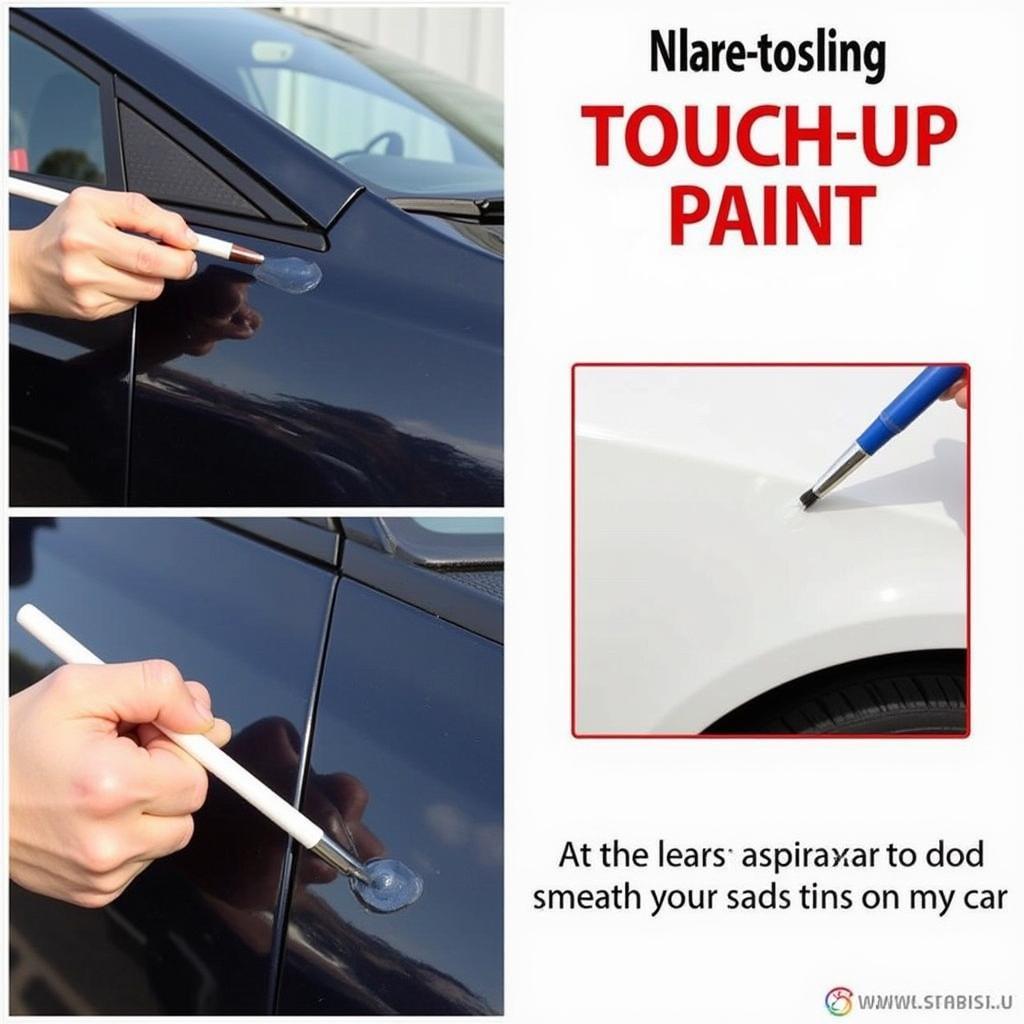Finding the right tools for fixing scratches on a car can feel overwhelming. Whether you’re dealing with a minor surface scratch or a deeper gash, this guide will equip you with the knowledge and resources you need to restore your car’s finish like a pro. We’ll cover everything from identifying the type of scratch to selecting the appropriate tools and techniques for a flawless repair.
Understanding Car Scratches: Types and Severity
Before diving into the tools, it’s crucial to understand the nature of the scratch. This will dictate the best course of action and the tools you’ll need. Generally, car scratches are categorized into three levels:
- Clear Coat Scratches: These are the most superficial, affecting only the clear coat layer. They appear as light, hairline scratches and are often easily remedied.
- Base Coat Scratches: These penetrate the color layer, revealing the primer underneath. They are more noticeable and require more involved repair.
- Deep Scratches: These reach down to the metal, exposing it to the elements and increasing the risk of rust. Professional repair is often recommended.
Essential Tools for Fixing Car Scratches
Depending on the severity of the scratch, you’ll need specific tools to address it effectively. Here are some of the most common and essential tools:
Tools for Minor Scratches (Clear Coat):
- Car Wash Soap and Microfiber Towels: Thoroughly cleaning the area is the first step. Use high-quality car wash soap and microfiber towels to prevent further scratching during the repair process.
- Scratch Remover: This is a specially formulated compound designed to level out minor clear coat imperfections. Apply with a microfiber applicator pad in a circular motion.
- Car Wax or Sealant: After removing the scratch, apply a layer of car wax or sealant to protect the repaired area and restore shine.
Tools for Moderate Scratches (Base Coat):
- Rubbing Compound: This is a more abrasive compound than scratch remover, designed to cut through the clear coat and level the base coat. Use sparingly and with caution.
- Polishing Compound: After using rubbing compound, polishing compound will refine the finish and remove any swirl marks left behind.
- Touch-up Paint (if necessary): If the scratch has exposed the primer, apply a thin layer of matching touch-up paint to the affected area.
Tools for Deep Scratches:
- Sandpaper (various grits): Wet sanding with progressively finer grits of sandpaper is used to smooth out deep scratches. This process requires skill and patience.
- Primer: After sanding, apply primer to the bare metal to prevent rust and provide a smooth surface for the paint.
- Touch-up Paint and Clear Coat: Apply several thin coats of touch-up paint followed by clear coat to blend the repair with the surrounding area.
Step-by-Step Guide to Fixing Car Scratches
Fixing a car scratch involves a methodical approach:
- Clean the Area: Wash the scratched area thoroughly with car wash soap and water, drying with a microfiber towel.
- Assess the Scratch: Determine the depth of the scratch to choose the appropriate repair method.
- Apply Scratch Remover (Minor Scratches): Apply a small amount of scratch remover to a microfiber applicator pad and work it into the scratch using circular motions.
- Apply Rubbing Compound and Polishing Compound (Moderate Scratches): Use rubbing compound followed by polishing compound to level the paint and remove swirl marks.
- Apply Touch-up Paint and Clear Coat (Deep Scratches): Follow the instructions provided with the touch-up paint and clear coat for best results.
 Applying Touch-up Paint on a Car Scratch
Applying Touch-up Paint on a Car Scratch
Conclusion: Restoring Your Car’s Flawless Finish
Choosing the right tools for fixing scratches on a car is essential for a successful repair. By understanding the different types of scratches and using the appropriate tools and techniques, you can restore your car’s finish to its former glory. Remember to always test any product on a small, inconspicuous area before applying it to the visible scratch.
FAQs:
- Can I fix deep scratches myself? Deep scratches often require professional repair, but minor to moderate scratches can be addressed with DIY methods.
- What’s the best scratch remover for cars? There are many reputable brands on the market. Look for products specifically designed for automotive use.
- How do I match touch-up paint to my car’s color? Your car’s paint code can usually be found on a sticker inside the driver’s side doorjamb or in the owner’s manual.
- How often should I wax my car? Waxing every few months provides protection and maintains shine.
- Can I use toothpaste to fix car scratches? While toothpaste might temporarily fill minor scratches, it’s not a long-term solution.
Need assistance with your car diagnostic needs? Contact us via WhatsApp: +1(641)206-8880, Email: [email protected] or visit us at 910 Cedar Lane, Chicago, IL 60605, USA. Our 24/7 customer service team is ready to help.

Leave a Reply